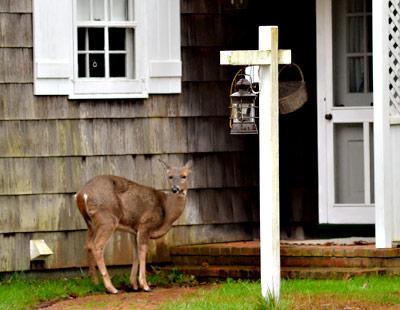Hunters Offer Help For Hungry

With help from private donors, deer hunters are offering up their bounty to local food pantries, turning a surplus of deer into a supplemental source of food for people in need.
“We’re grateful for it,” said Gabrielle Scarpaci, the executive director of the East Hampton Food Pantry, which she said will serve about 400 families between Thanksgiving and Christmas at its Accabonac Road location and a satellite in Amagansett. “We used to buy chicken every week, we can’t afford to do that any more,” she said, adding that the pantry always welcomes any kind of food or financial donation.
“We were approached by a few groups. They can cull the herds, and then donate the venison to the pantries. If people are against that, they’re a little more supportive because it’s going to feed people in the area,” she said. Meat is dropped off at the East Hampton Food Pantry on Tuesday mornings. “The small amounts we get each week go out, and people are happy to take it, especially if they have children. It goes a little further than what we’re giving them each week, which is only two or three days’ worth of food.”
Over the past few years, private donors have helped sustain the program, which arranges for a butcher to prepare the meat, which is then packaged into three-pound sealed bags and frozen for delivery to the pantries.
According to Russ Calemmo, the organizer of the venison program and a member of the East Hampton Food Pantry’s board of directors, 2,829 people received fresh ground venison from this program last year. “I’m getting more and more people involved. They’re getting the message out, I get the product, and we process it. A lot of professionals are involved in the process.”
Mr. Calemmo said that the local deer population, which has no natural predators here, increases by 30 percent a year. “We can solve two problems, overpopulation [of deer] and hunger. We have this program to a science,” he said. “I’m taking thousands of pounds. Nothing gets wasted if I can help it.”
The East Hampton Sportsmen’s Alliance, a new organization of hunters and fishermen, is also in on the effort. Part of the group’s mission is to protect traditional hunting and fishing rights, but its members are concerned, too, about the negative impacts of the large deer population.
According to Terry O’Riordan, the group’s treasurer, the average deer eats 40 salads a day. Multiplied by 10 deer, that statistic grows to 2,800 salads in a week. “The herd is just out of control. The floor and forest of the woods in East Hampton Town, the biodiversity has been so altered and destroyed by the deer,” he said.
East Hampton Town’s deer management working group has been developing a comprehensive deer management program; a preliminary report is anticipated by mid-December, according to Councilman Dominick Stanzione.
“We help the herd-control problem and get food in people’s houses through personal connections or the food pantry,” Mr. O’Riordan said.
A private donor pays to have the deer meat butchered and distributed to local pantries.
Hunters who wish to donate a deer can get in touch with Mr. O’Riordan, who will arrange for the deer to be transported to the butcher, where it will be processed into ground meat. “The deer has to be field-dressed and eviscerated,” he said.
The butcher who prepares the venison wishes to remain anonymous, but Mr. O’Riordan said he told him this week that he had processed about 700 pounds of venison since Oct. 1, when bow hunting season opened on the South Fork. The season runs through Dec. 31. Shotgun season is in January on weekdays only.
The East Hampton Food Pantry “is the only facility with freezers, and we need lots of them,” Mr. Calemmo said, adding that the Lions Club also provides its refrigerators. “We’re hoping to solicit some organizations to get vehicles so that we can deliver our product,” he added.
